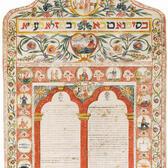Tirzah Meacham (leBeit Yoreh)
Tirzah Meacham (leBeit Yoreh) received a B.A. in philosophy from the University of Wisconsin (Madison); and a B.A. equivalent, M.A. and Ph.D. in Talmudic and Rabbinic literature from The Hebrew University of Jerusalem. She edited Sefer haBagrut leRav Shmuel ben Hofni Gaon veSefer haShanim leRav Yehuda haKohen Rosh haSeder (with Miriam Frenkel as translator from Judeo-Arabic to Hebrew, 1998). With Harry Fox (leBeit Yoreh) she edited Introducing Tosefta: Textual, Intratextual and Intertextual Studies (1999). She is an associate professor of Talmudic and Rabbinic literature in the Department of Near and Middle Eastern Civilizations at the University of Toronto.



